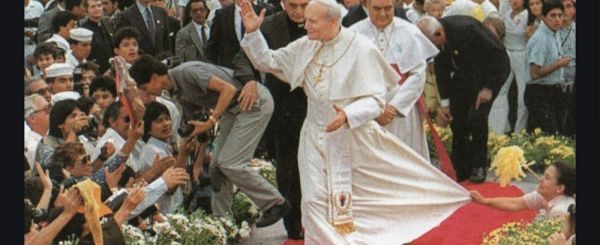Dearest brothers and sons!
It is dear to me to address you again today, who have gathered here for the Angelus prayer in the atmosphere so typical and intimate of holy Christmas. Today, in fact, Christmas continues its salutary and invigorating atmosphere, and our souls still breathe in it because of the sense of enduring wonder and amazement before the great event which has taken place and which, inexhaustible in its efficacy, is projected into the whole course of time. I mean the event or, more precisely, the mystery of the Son of God being born in Bethlehem as the Son of Man, to make himself our brother and saviour for us.
So august and unfathomable is this mystery that we cannot meditate on it enough. For this reason, the Church in her liturgical and catechetical wisdom proposes it to us every year, for a commemoration that extends over not a few days and is articulated in a special cycle that we call the 'Christmas liturgical cycle'.
2. And I wish to venerate with you St Stephen, the first Christian martyr, as the Church does on the day after the feast of Christmas.
"Yesterday we celebrated the temporal birth of our eternal king; today we celebrate the glorious passion of one of his soldiers. For yesterday our King, clothed in the noble robe of his flesh, coming forth from the palace of the virginal bosom, deigned to visit the world; today one of his soldiers, leaving the tent of the body, has ascended as a triumphant man into heaven'. These are the evocative expressions of a saint of the early Church, St Fulgentius (St Fulgentius, Sermo 3, 1), and they retain their meaning intact because they enucleate a relationship not only of liturgical continuity between the feast of Christmas and that of the protomartyr, but also, above all, of intrinsic connection in the order of holiness and grace. Christ, king of history and redeemer of man, stands at the centre of that journey towards perfection, to which he calls man, every man.
As we venerate St Stephen and his invincible example as a witness to Christ, as he showed himself by his spirited speech, by his concern for the service of the poor, by his constancy during his trial and, above all, by his heroic death, we see that his figure is illuminated and magnified in the light of his Lord and master, whom he wanted to follow in the supreme sacrifice. It is the Lord Jesus who alone provides the succour and comfort necessary for souls to be faithful unto death.
From this derives a valuable lesson for us: looking at Stephen in the perspective of Christmas, we must take up his example and his teaching, which univocally lead us back to Christ who, born in the cave of Bethlehem, is already on his way - in the final intention of the redemptive work - to the hill of Calvary. Made sons of God by him, called to live as sons of God, we too will be crowned like Stephen up there, in the homeland, if we are faithful.
[Pope John Paul II, Angelus 26 December 1980]












